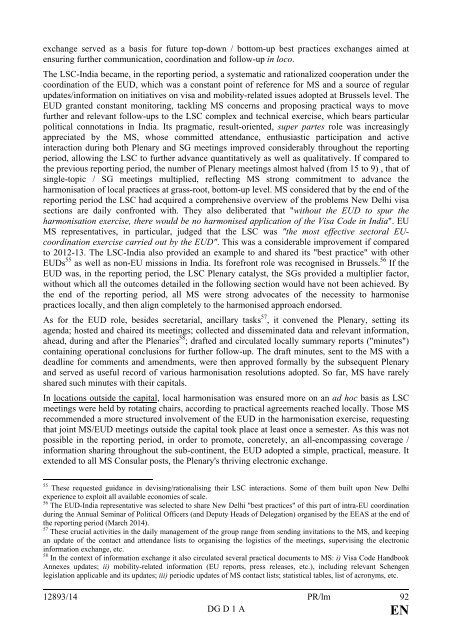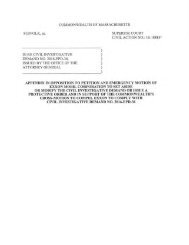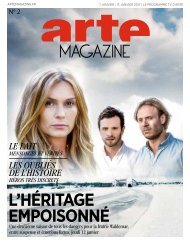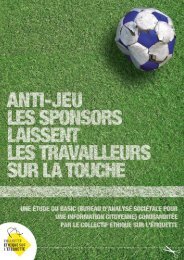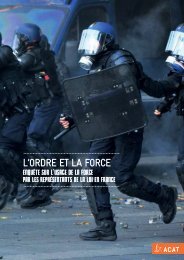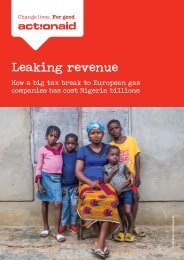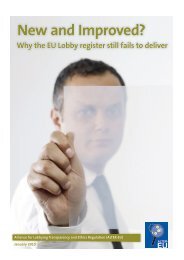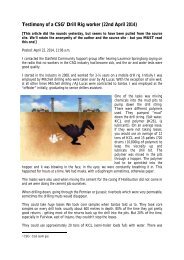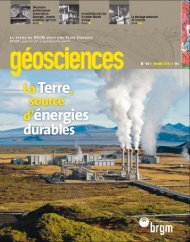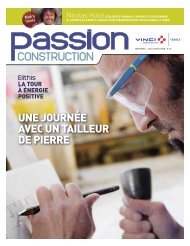eu-com-schengen-coop
eu-com-schengen-coop
eu-com-schengen-coop
Create successful ePaper yourself
Turn your PDF publications into a flip-book with our unique Google optimized e-Paper software.
exchange served as a basis for future top-down / bottom-up best practices exchanges aimed at<br />
ensuring further <strong>com</strong>munication, coordination and follow-up in loco.<br />
The LSC-India became, in the reporting period, a systematic and rationalized <strong>coop</strong>eration under the<br />
coordination of the EUD, which was a constant point of reference for MS and a source of regular<br />
updates/information on initiatives on visa and mobility-related issues adopted at Brussels level. The<br />
EUD granted constant monitoring, tackling MS concerns and proposing practical ways to move<br />
further and relevant follow-ups to the LSC <strong>com</strong>plex and technical exercise, which bears particular<br />
political connotations in India. Its pragmatic, result-oriented, super partes role was increasingly<br />
appreciated by the MS, whose <strong>com</strong>mitted attendance, enthusiastic participation and active<br />
interaction during both Plenary and SG meetings improved considerably throughout the reporting<br />
period, allowing the LSC to further advance quantitatively as well as qualitatively. If <strong>com</strong>pared to<br />
the previous reporting period, the number of Plenary meetings almost halved (from 15 to 9) , that of<br />
single-topic / SG meetings multiplied, reflecting MS strong <strong>com</strong>mitment to advance the<br />
harmonisation of local practices at grass-root, bottom-up level. MS considered that by the end of the<br />
reporting period the LSC had acquired a <strong>com</strong>prehensive overview of the problems New Delhi visa<br />
sections are daily confronted with. They also deliberated that "without the EUD to spur the<br />
harmonisation exercise, there would be no harmonised application of the Visa Code in India". EU<br />
MS representatives, in particular, judged that the LSC was "the most effective sectoral EUcoordination<br />
exercise carried out by the EUD". This was a considerable improvement if <strong>com</strong>pared<br />
to 2012-13. The LSC-India also provided an example to and shared its "best practice" with other<br />
EUDs 55 as well as non-EU missions in India. Its forefront role was recognised in Brussels. 56 If the<br />
EUD was, in the reporting period, the LSC Plenary catalyst, the SGs provided a multiplier factor,<br />
without which all the out<strong>com</strong>es detailed in the following section would have not been achieved. By<br />
the end of the reporting period, all MS were strong advocates of the necessity to harmonise<br />
practices locally, and then align <strong>com</strong>pletely to the harmonised approach endorsed.<br />
As for the EUD role, besides secretarial, ancillary tasks 57 , it convened the Plenary, setting its<br />
agenda; hosted and chaired its meetings; collected and disseminated data and relevant information,<br />
ahead, during and after the Plenaries 58 ; drafted and circulated locally summary reports ("minutes")<br />
containing operational conclusions for further follow-up. The draft minutes, sent to the MS with a<br />
deadline for <strong>com</strong>ments and amendments, were then approved formally by the subsequent Plenary<br />
and served as useful record of various harmonisation resolutions adopted. So far, MS have rarely<br />
shared such minutes with their capitals.<br />
In locations outside the capital, local harmonisation was ensured more on an ad hoc basis as LSC<br />
meetings were held by rotating chairs, according to practical agreements reached locally. Those MS<br />
re<strong>com</strong>mended a more structured involvement of the EUD in the harmonisation exercise, requesting<br />
that joint MS/EUD meetings outside the capital took place at least once a semester. As this was not<br />
possible in the reporting period, in order to promote, concretely, an all-en<strong>com</strong>passing coverage /<br />
information sharing throughout the sub-continent, the EUD adopted a simple, practical, measure. It<br />
extended to all MS Consular posts, the Plenary's thriving electronic exchange.<br />
55 These requested guidance in devising/rationalising their LSC interactions. Some of them built upon New Delhi<br />
experience to exploit all available economies of scale.<br />
56 The EUD-India representative was selected to share New Delhi "best practices" of this part of intra-EU coordination<br />
during the Annual Seminar of Political Officers (and Deputy Heads of Delegation) organised by the EEAS at the end of<br />
the reporting period (March 2014).<br />
57 These crucial activities in the daily management of the group range from sending invitations to the MS, and keeping<br />
an update of the contact and attendance lists to organising the logistics of the meetings, supervising the electronic<br />
information exchange, etc.<br />
58 In the context of information exchange it also circulated several practical documents to MS: i) Visa Code Handbook<br />
Annexes updates; ii) mobility-related information (EU reports, press releases, etc.), including relevant Schengen<br />
legislation applicable and its updates; iii) periodic updates of MS contact lists; statistical tables, list of acronyms, etc.<br />
12893/14 PR/lm 92<br />
DG D 1 A<br />
EN


